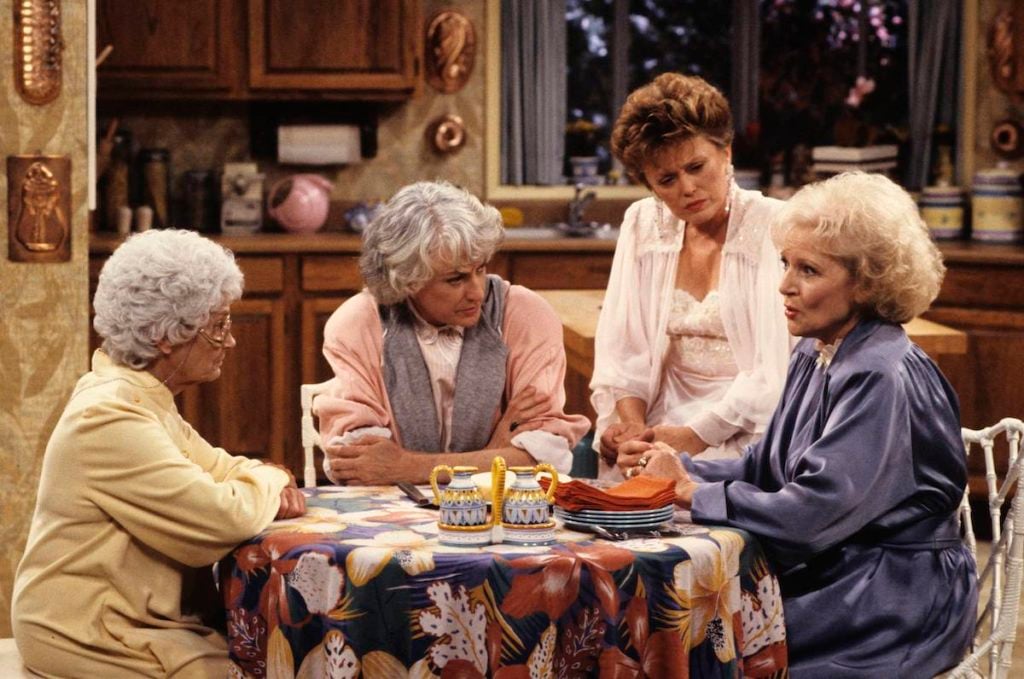LONG BEACH — Picture it. Long Beach 2019.
Two Cal State Long Beach professors teach students about women and aging through the lens of the 1980s classic sitcom “The Golden Girls.”
That’s right, Blanche, Dorothy, Rose, and Sophia’s funny and heartfelt advice on sex, ageism, HIV, sexuality, elder abuse, and discrimination, offer wisdom lessons in “Women & Aging: Lessons from the Golden Girls.”
‘Golden Girls’ class
Maria Claver, gerontology program director, and Long Wang, assistant professor of nutrition and dietetics, collaboratively teach the interdisciplinary course, which was first offered in the Spring 2018 semester.
Each class begins with an episode of “The Golden Girls” followed by a lecture and conversation with the 21 enrolled students.
‘Golden Girls’ TV show
Set in Miami, “The Golden Girls” follows four women over 50 who are roommates and become great friends: Blanche Devereaux (Rue McClanahan), Rose Nylund (Betty White), Dorothy Zbornak (Bea Arthur), and Sophia Petrillo (Estelle Getty). Their kitchen-table gossip and frank discussions were ratings gold. “The Golden Girls” premiered in 1985 and ran seven seasons, totaling 180 episodes.
LGBTQ fans
“The Golden Girls” was an immediate hit with LGBTQ audiences, and the characters have been icons in the community. The series is in syndication on the Hallmark Channel and TV Land and available on Hulu.
“The Golden Girls” was created and written by Susan Harris, who also created the ABC sitcom “Soap.” That pioneering series, which ran from 1977 to 1981, introduced one of primetime’s first gay characters, Jody Dallas, played by Billy Crystal.
In an interview with Q Voice News, Claver and Wang, who identifies as gay, discuss how the series is timeless and relevant, the portrayal of gay and lesbian characters, and their favorite episode.
Here are some excerpts.
Idea for the idea
MARIA CLAVER: I had been thinking about doing this class about 10 years. The timing was right last year to move forward when Long joined the faculty. We both are obsessed with ‘The Golden Girls.’ He would quiz me, What was Blanche’s sister’s name? The one who needed the kidney. I was like, Wow. He’s serious. (The sister’s name is Virginia. – Ed)
“I wanted the class to be interdisciplinary. We can look at aging in different ways.”
LONG WANG: “A lot of topics we touch on in this class are very heavy. Using comedy as a ramp to the topics is a better way to introduce those topics to the students.”
‘Golden Girls’ was groundbreaking
CLAVER: “The show was groundbreaking for the time. The show touches on heavy topics with humor. So many of these topics are relevant today.
“In the episode ‘72 Hours,’ Rose gets a letter from a hospital where she had surgery and a blood transfusion and might have HIV. (72 hours was the time it took to receive HIV test results) We do a class on older women and HIV. A lot of times, older women were not educated about sexually transmitted infections. They were taught about not getting pregnant.”
WANG: The show was ahead of its time. HIV was not a topic of conversation in the nation. In the episode, Rose says, Why is this happening to me?”
CLAVER: “Blanche says, This isn’t a punishment from God. They could push the envelope and challenge the stigma because it was four older women.”
“In other episodes, Rose is addicted to pain pills. Dorothy has a gambling addiction. The show also talks about the role of sex in a relationship. Students don’t think they will be hearing about these topics in a gerontology class.”

The Iconic hit series “The Golden Girls” was a groundbreaking show used comedy as a bridge to address serious issues and make social commentary on such topics as elder abuse, sexuality, racism, homelessness. The show starred (from left to right) Estelle Getty, Bea Arthur, Rue McClanahan, and Betty White as four previously married women who live together and are great friends. Photo: Hulu.
Gay, lesbian characters
CLAVER: “The gay characters were presented respectfully.”
WANG: “Blanche’s brother, Clayton, and Dorothy’s friend, Pat, were not depicted stereotypically. Pat was not a butch lesbian. Blanche’s brother was not feminine. That was helpful for the audience. They looked like ordinary people. That was very powerful.
“In addition, how the other characters reacted to the gay and lesbian characters was important. In the episode when Pat said she was falling in love with Rose, Sophia didn’t think it was a big deal. Blanche reacted, but her fury was, How dare Pat like Rose instead of me. Pat being a lesbian was a non issue.”
Favorite episode
Claver and Long both agreed ‘72 Hours’ was at the top of the list.
CLAVER: “ ‘72 Hours’ is one of the most powerful episodes. It put the concerns that people in the community had about HIV right out there. Rose says, People like me don’t get HIV. They addressed it head on, and it wasn’t offensive.”
Still relevant
CLAVER: “ ‘The Golden Girls’ is 1,000 percent relevant today. Older woman are still facing some of the same issues they faced 35 years ago.”
WANG: “It’s relevant because of the subjects and how they approached them. The writers did their homework and had great consultants.”
